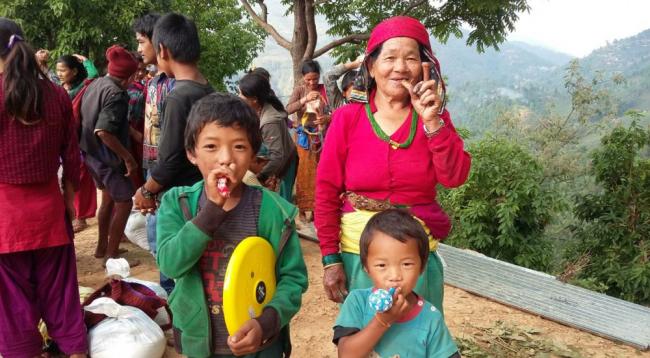Ballardite volunteers in Nepal
Tue, 05/26/2015
By Susan Alotrico
Susan is a Ballard resident but currently traveling and volunteering in Nepal. She recently returned from volunteering for the PeaceCops in Thailand in 2012 to 2015.
There are so many unsung heros delivering earthquake aid in Nepal. I am talking about the Nepalese people, ordinary citizens, who are dealing with their own fears and life situation, with less money than NGO’s with big names and logos. What is astounding to me is how many young people in their 20’s organize funds, food and supplies, mobilize their friends, gather relief materials, package bags and then deliver them under the toughest of conditions. I have had the pleasure to meet and work with some of these young heroes. I accompanied a relief effort yesterday that involved sitting on a motorcycle for 16 hours, much of it traversing mountainous single lane primate roads.
On the journey out of Katmandu, traffic was heavy; the air was thick with black smoke as our motorcycle edged between buses and trucks, when larger vehicles were stuck in a long line of halted traffic.
People affected by the earthquake now live in a fish bowl. There is little privacy. People bathe partially clothed in rivers, under communal water taps, sleep in night gowns under tarps, gather leaves and plants along the side of the road, comb each other’s hair, wash clothes with a stone, haul buckets of water to their tent, and use public toilets.
Devastation worsened with every mile. Deep inside Nuwarok district, our road was reduced to a rubble strewn path, a war zone, with homes obliterated on each side of the road… people sat on top of their homes a dirt pile, with no where to go. Tents set up outside where people prefer to sleep at night. We waited as traffic had stopped as a home -- partially destroyed -- was demolished by a claw tractor. A crowd gathered and children cheered as the house was razed. The house had become a public hazard leaning into the “road.” An elder man, broken with emotion, told me it was his house. He gestured to indicate he and his wife had lived there for many years. I held his hands and hugged him and told him I was sorry. A friend later responded about it by stating, everyone has troubles. Rightly or wrongly, I could not help but feel how lucky the old man was, to have a wife and be in his elder years; to be alive. But then again, I am not sleeping outside in a tent, with uncertainty of where my next meal will come from. Who will help him rebuild a house?
As we passed a graveyard of houses, there would be one or two standing in a freakish contrast, ashamed to be whole, but vacant of all life. The landscape was uninhabitable, and people were sitting about here and there, gathered. Silent. Engaged in some ordinary exchange of life. They looked to us, seemingly hopeful, but we would not be stopping here. My first thought was I should not smile and say “hello” or “namaste,” there is nothing to smile about. But when my eyes reached theirs, I could not help myself. I said “hello” and “namaste” and they easily and often loudly, responded with “hello” and “namaste,” back. Maybe they felt affirmed in that moment or felt glad to be seen, recognized.
Around one bend in the road I would smell jasmine in the air. Then the stench of a dead animal would interrupt the otherwise pleasant smell of the idyllic countryside we traveled through.
We had a relief truck and a caravan of seven motorcycles and 14 people. We set out Friday morning, May 15, to the high mountains of Nuwakot. The village we were headed to, Parmachet Samari, was an eight hour trip each way, home to about 800 families. It was not a town. Small settlements of homes were concentrated in scattered areas in the mountains.
The donation effort was led by Himal Roka, who donated all the supplies on behalf of a Nepali association, Baglung Sewa Samaj, in New York City. His friend Ram Tamang was the leader, as it was his village we were to aid. Volunteers included staff from ADRF and their friends.
In addition to earthquake damage to homes, the village’s dream school, built a year ago by its village hero, Ram Tamang, was completed destroyed. Up to 100 children studied there. It will have to be totally rebuilt.
Provisions were packed for about 111 families including: tarp, soap, rice, dal, garbanzo beans, beaten rice, salt, oil, and texturized protein. In addition, a cloth bag was given to each family that contained a frisbee, ball, balloons and a bag of candy. Without a doubt, this was the best surprise for them. After a short frisbee lesson, they played together or alone totally absorbed, smiling and laughing. Their smiles and laughter gave me hope that their lives could be rebuilt and they could be stronger and more resilient.
Then it was time to leave. Everyone had to walk back to the settlement in the woods before dark. Most were barefoot. I had made friends with many children, and gave them my Facebook name. The mommas and myself took pictures, and I shared a pipe with one of the women, much to their delight.
On the return, three of our team fell off their bikes navigating the wet slippery rocky road. Luckily no one was hurt. Around 11pm, we hit flat land it was a thrill to ride under starlight into the empty pre-dawn streets of Katmandu. Only us and the street dogs. We were all happy to arrive home at one in the morning.
Check out more of Susan’s travels at https://susanalotrico.wordpress.com


